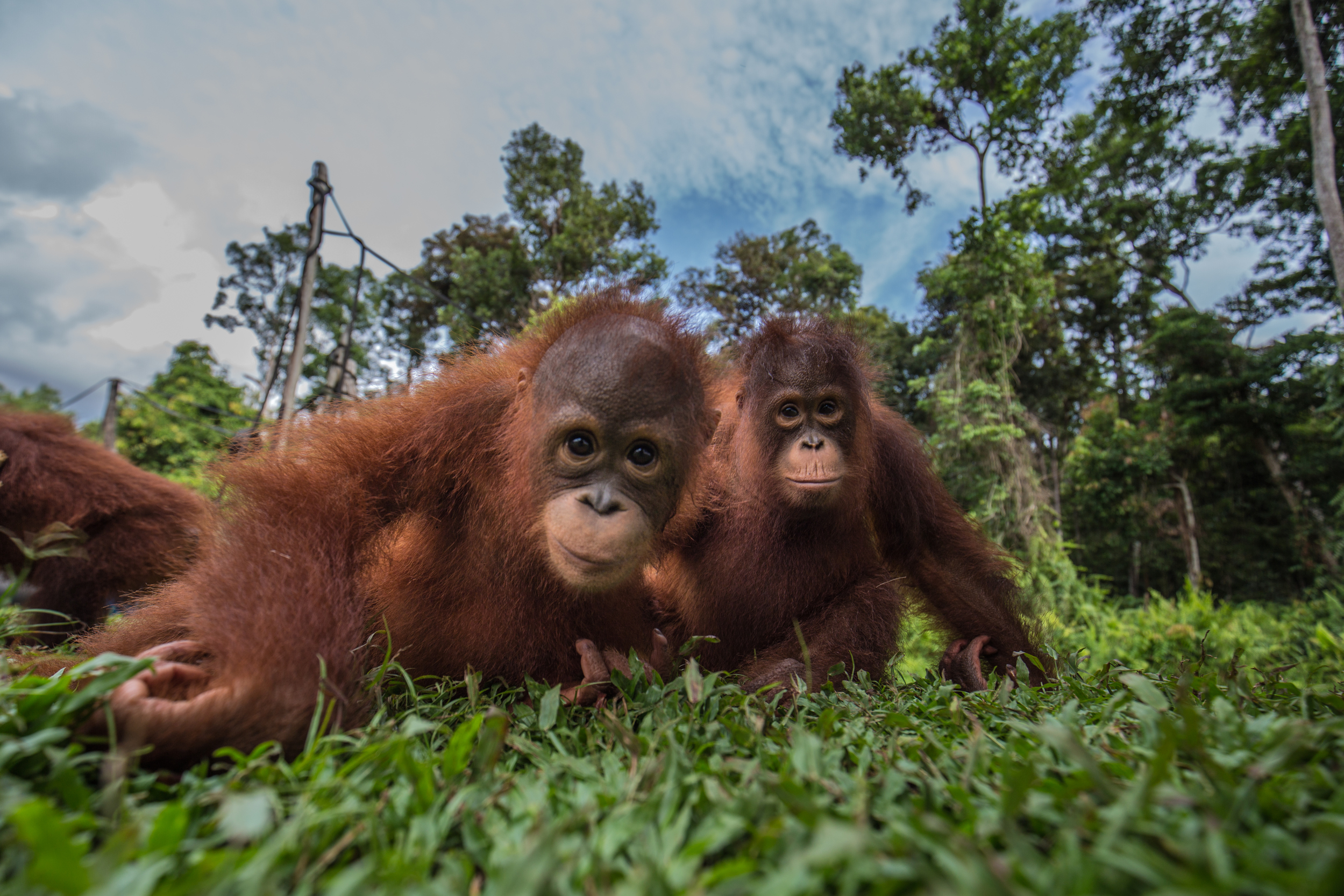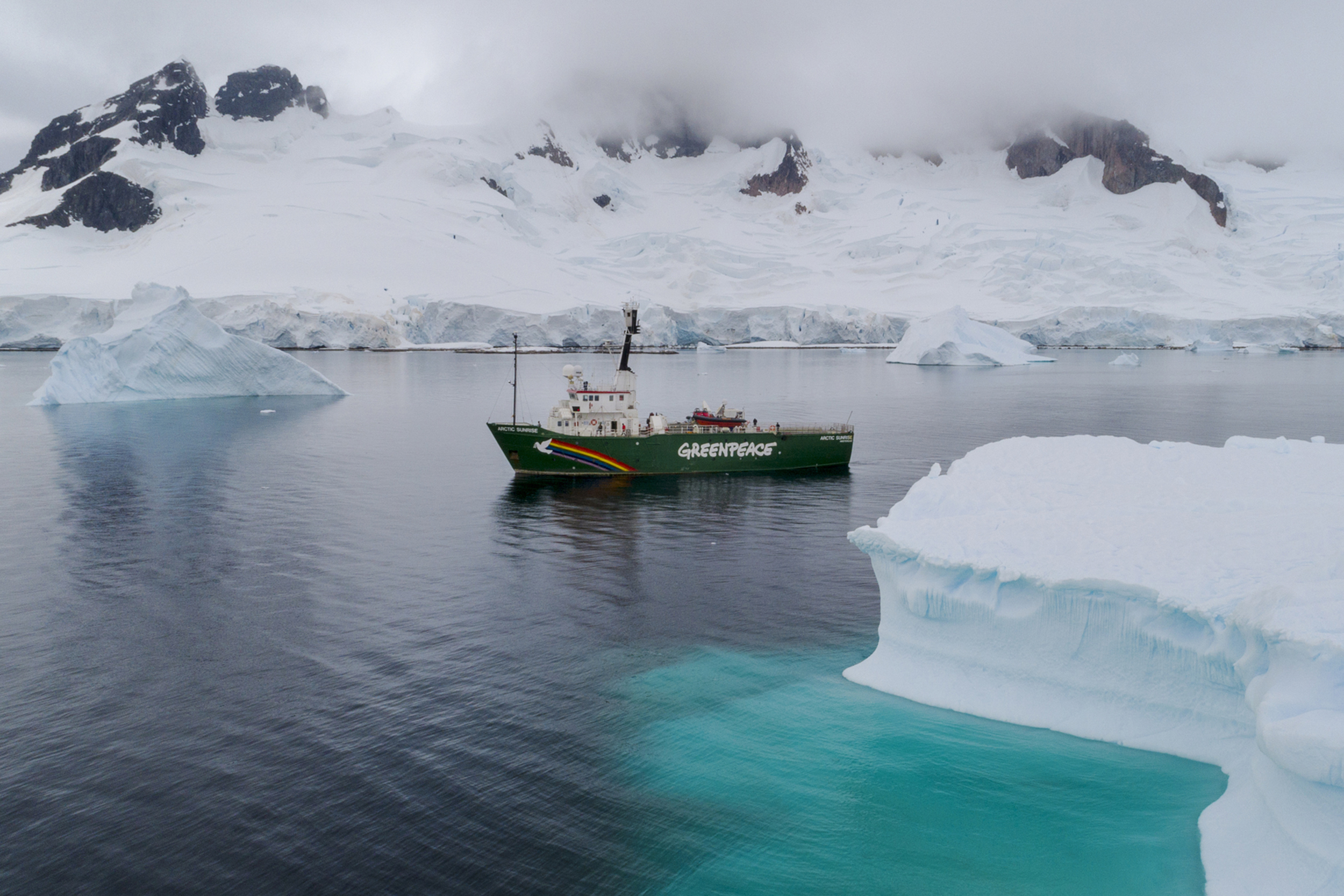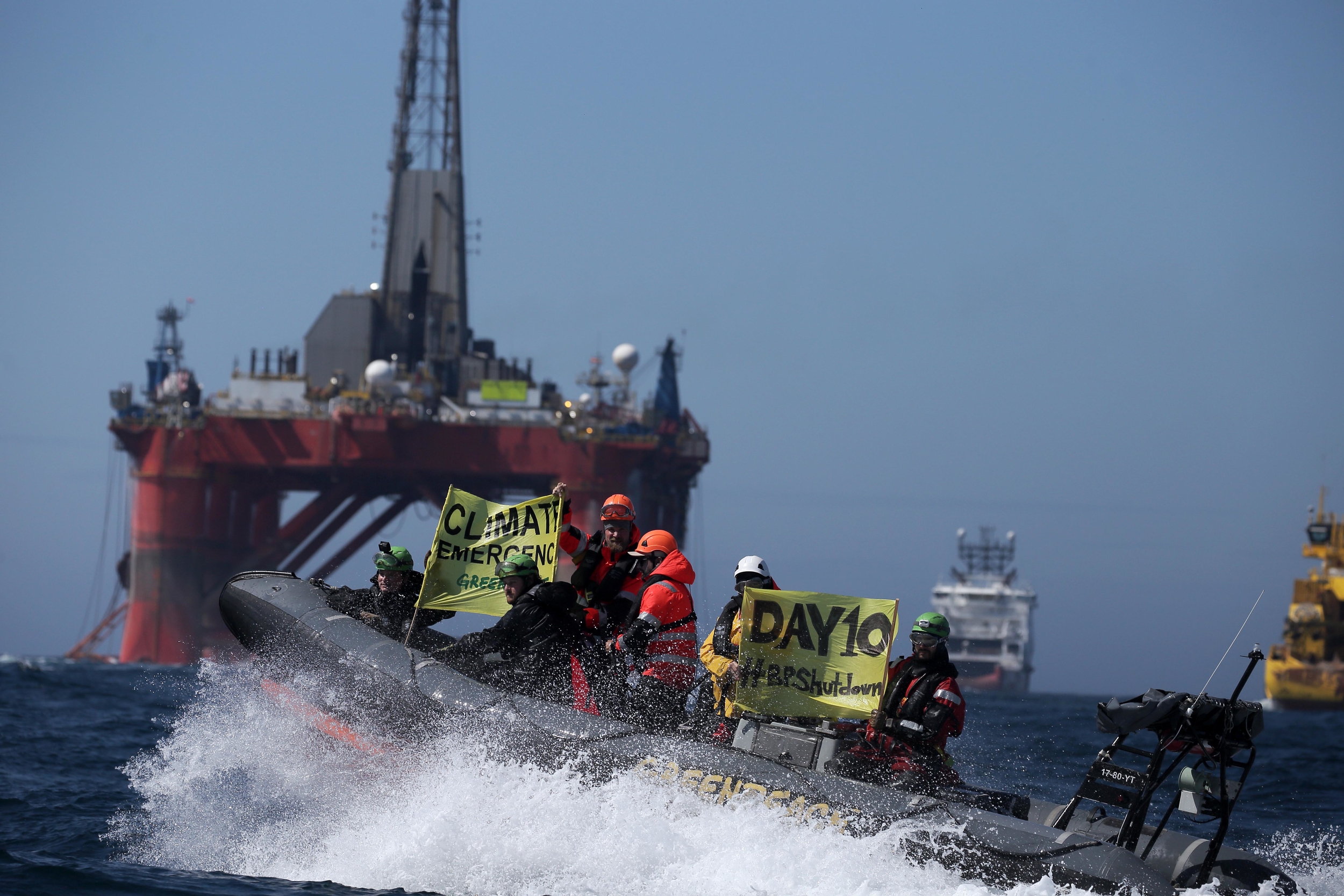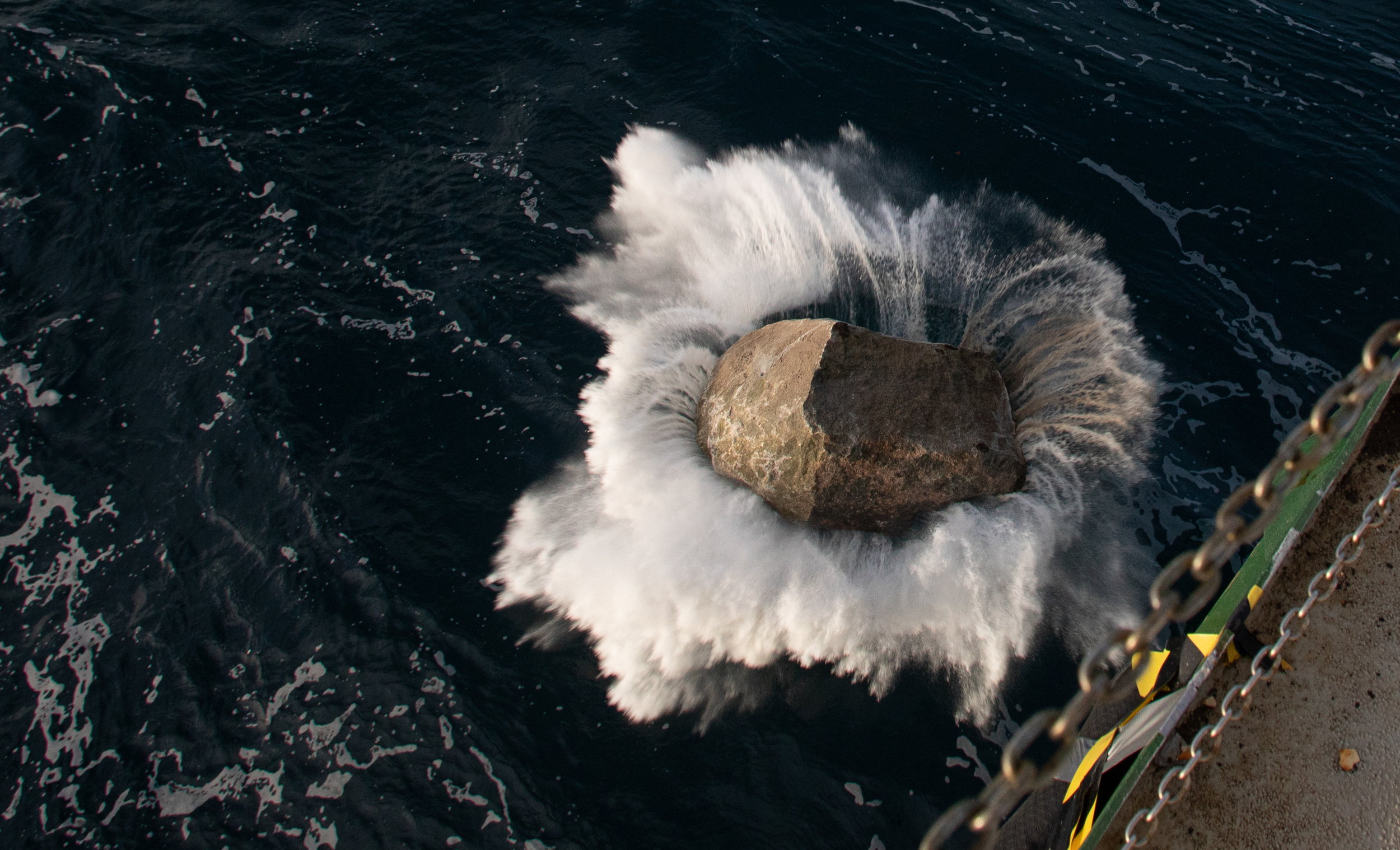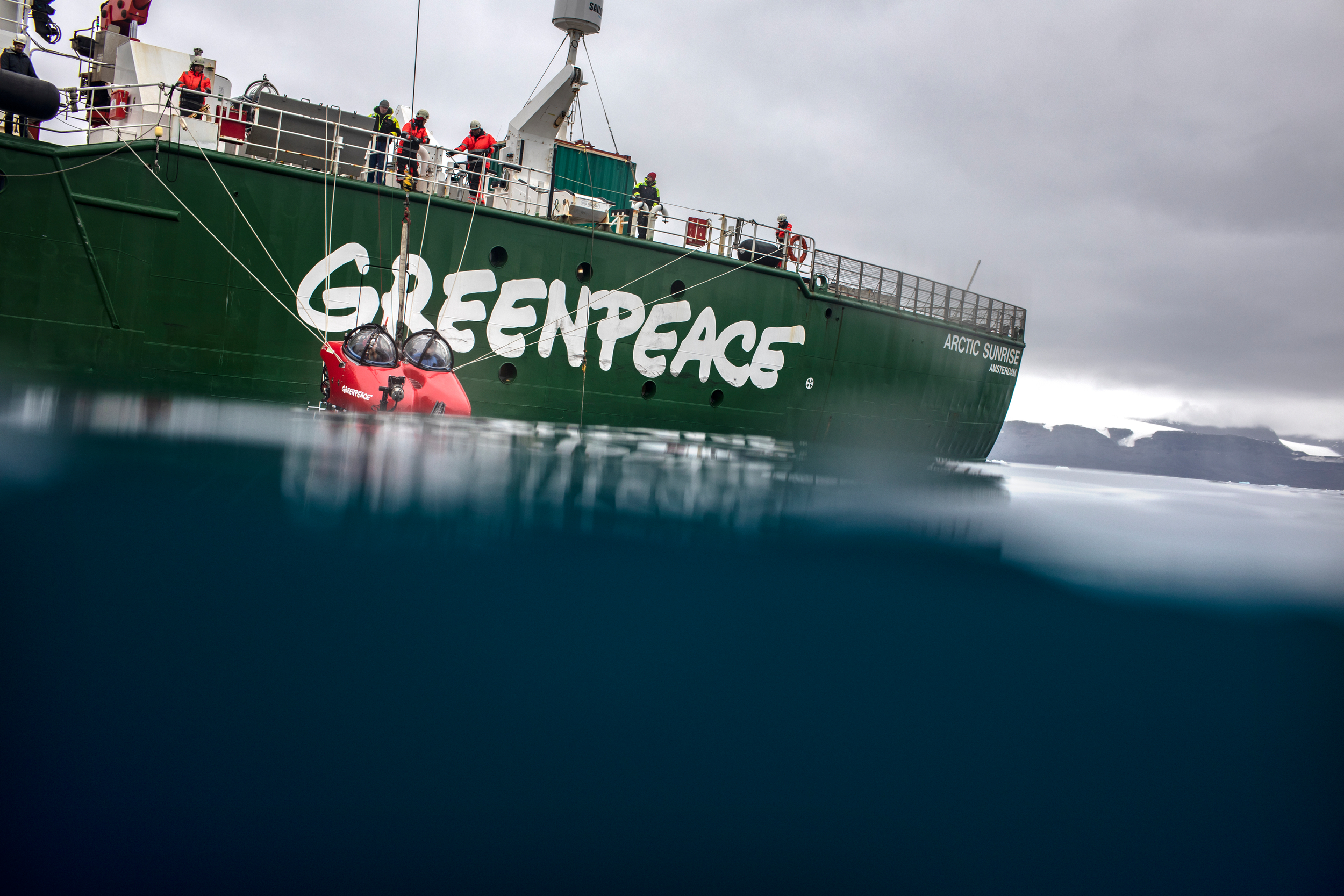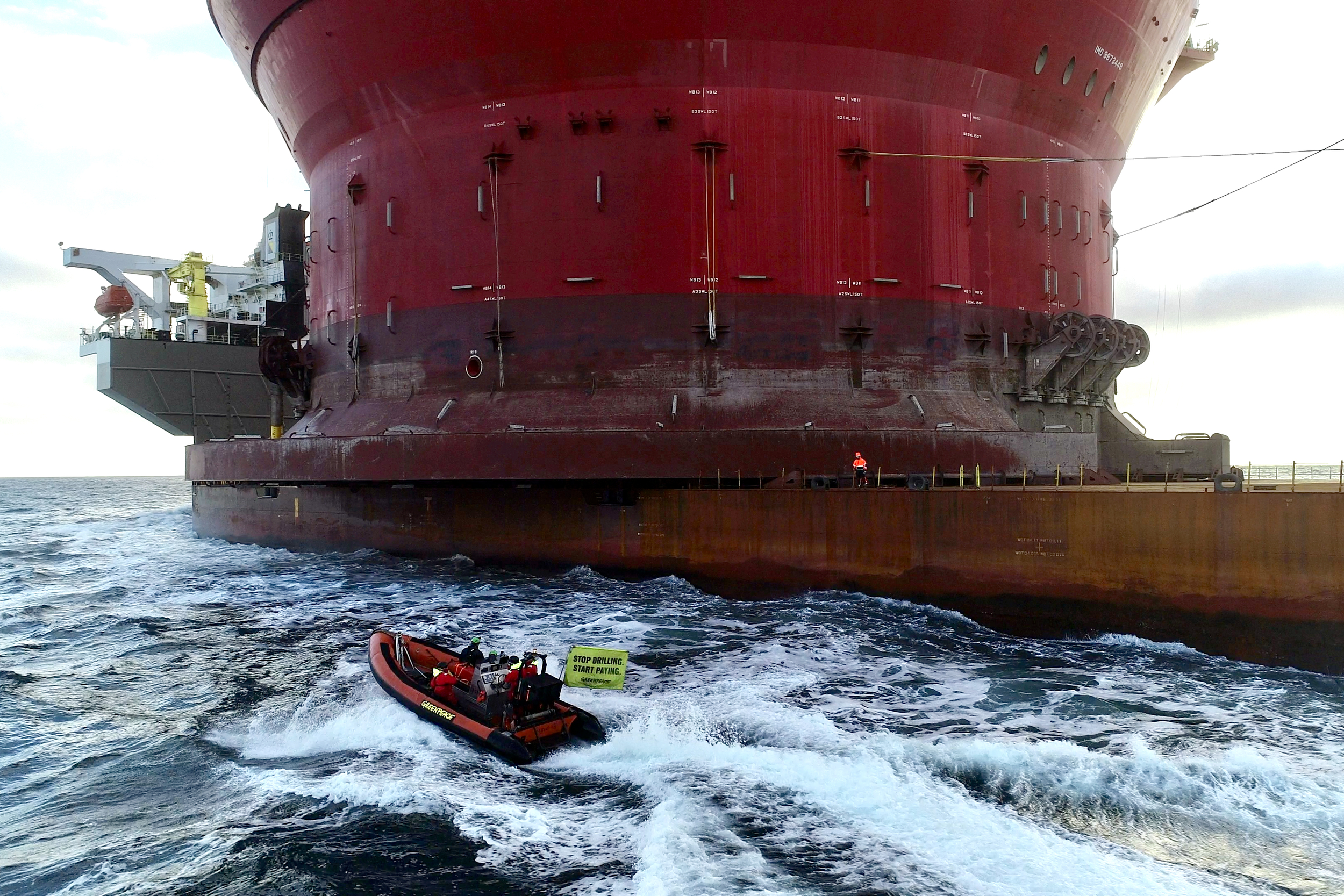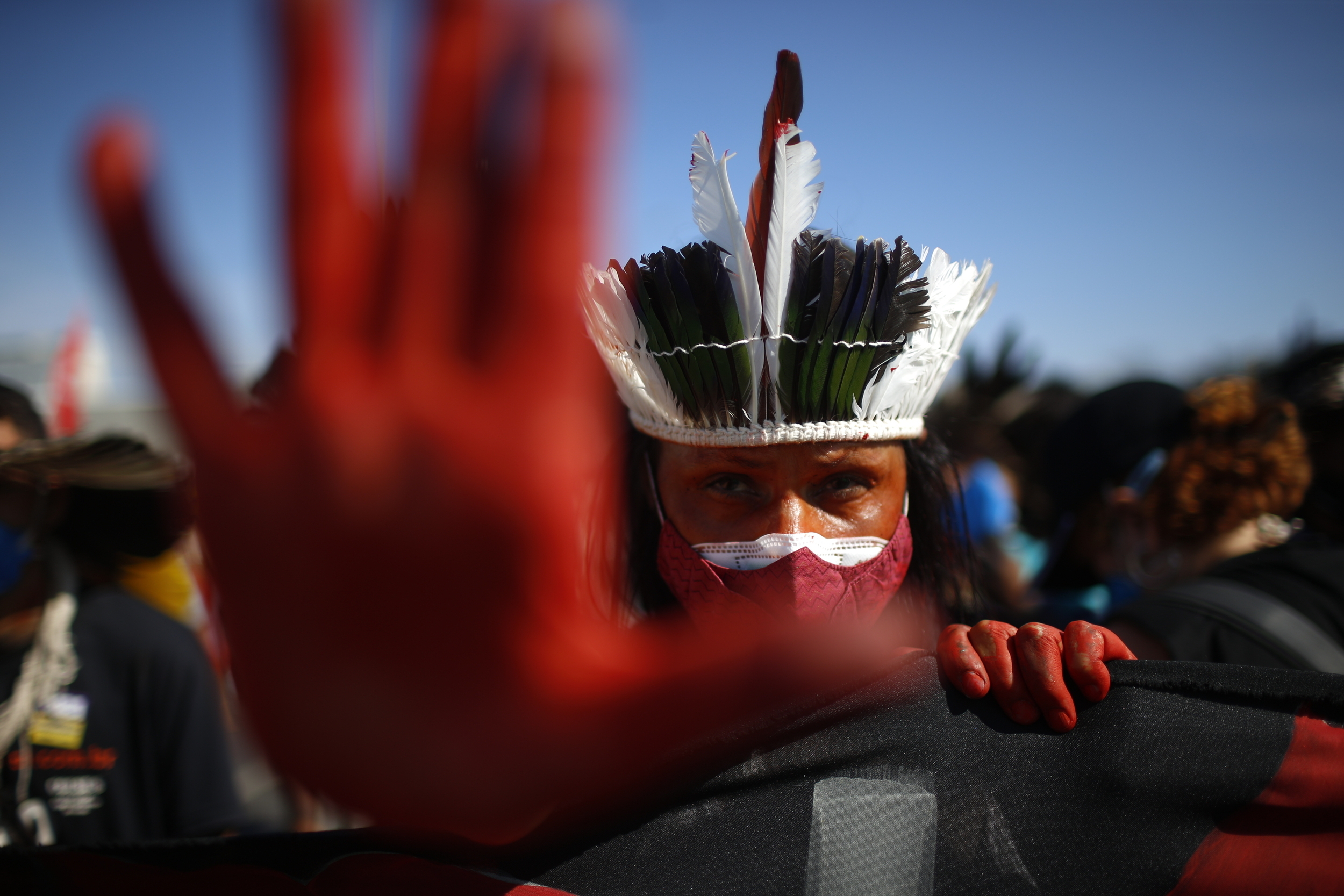
Impact report 2021
Greenpeace impact reports
The Greenpeace story has always been one of community and togetherness.
That spirit has been in our DNA ever since 1971, when a small group of activists joined forces to sail a ship called The Greenpeace to Amchitka island, off Alaska, and protest against US nuclear testing. Fifty years on, our determination to bring people together to stand up for our planet is as strong as ever. If there is a consistent theme in this review of 2021, it is that we continued to build new links and collaborate more widely, while also deepening our commitment to be allies to those in the environmental movement who are too often ignored or silenced.
It was inspiring to stand alongside young people, in particular, and call for a greener, fairer, more peaceful future throughout the year. As we sailed through the Indian Ocean to build the case for ocean protection, 24-year-old scientist and campaigner Shaama Sandooyea joined us to stage the world’s first underwater climate strike. And young activists from Bangladesh, Mexico, Namibia and Uganda then sailed with us on the Rainbow Warrior to the COP26 climate conference in Glasgow, sharing their experiences from the climate frontline directly with world leaders. We have never been interested in acting alone, and it is a privilege to share our platform with those whose experiences must guide the global response to the climate crisis.
We also continued to build and strengthen links with a huge range of organisations and individuals who share our goals. The idea that no one is a permanent enemy or a permanent friend is another of our guiding values, and it is a matter of great pride to me to read a quote like the one from Jake Molloy. As a union organiser in the oil sector, he admits that even a few years ago he wouldn’t have believed he would build links with Greenpeace. But Jake recognises, as we do, that a just transition to a renewable future depends on supporting workers to shift away from fossil fuel industries. By working together, we can make sure effective support materialises and works for everyone.
These are just a few of the many examples of collaboration and togetherness that defined our work in 2021. As we stand with young people, with fossil fuel workers who want to shift to renewables and with everyone from Indigenous Peoples in the Amazon to fishing communities on the English coast, we will confront the climate and nature crises at this critical moment for our planet. There is still time to transform our food system, to protect our forests and oceans and to make a just transition to renewables – but only if we act together and act fast.
So I would like to thank you for being with us as we enter our 51st year feeling more focused and more fired up than ever. And I would also like to extend a special thanks to John Sauven, who stepped down as Executive Director at the start of 2022, after 14 years at the helm. John played a vital role in getting Greenpeace to where we are today: a relentless, growing, global community, doing everything in our power to put the natural world, and the people who depend on it, first.
Thank you so much for your support. Nothing changes without you.
Pat Venditti
Acting Executive Director
Greenpeace ships
In 2021 our ships – the Rainbow Warrior, Arctic Sunrise and Esperanza – travelled a total of 66,737 nautical miles around the world. From taking action against deep sea mining in the Pacific to investigating industrial fishing in the Indian Ocean, our three ships provide invaluable support to Greenpeace campaigns around the world.
After Covid-19 prevented us having open boats in 2020, we were delighted this year to welcome hundreds of people back onto our ships in port from Amsterdam, to Istanbul and Scotland.
After 20 years our ship Esperanza – meaning ‘Hope’ – has come to the end of its working life. Over the course of two decades, the crew of the Esperanza confronted illegal fishing and whaling harpoons, from the polar regions to West Africa, teamed up with scientists and journalists to reveal illegal activities and conduct groundbreaking studies.
Esperanza was, and always will be, a symbol of hope, born from the support of millions of people around the world and put into action by those who risked their safety and lives to stand against impossible odds for the protection of our shared environment.
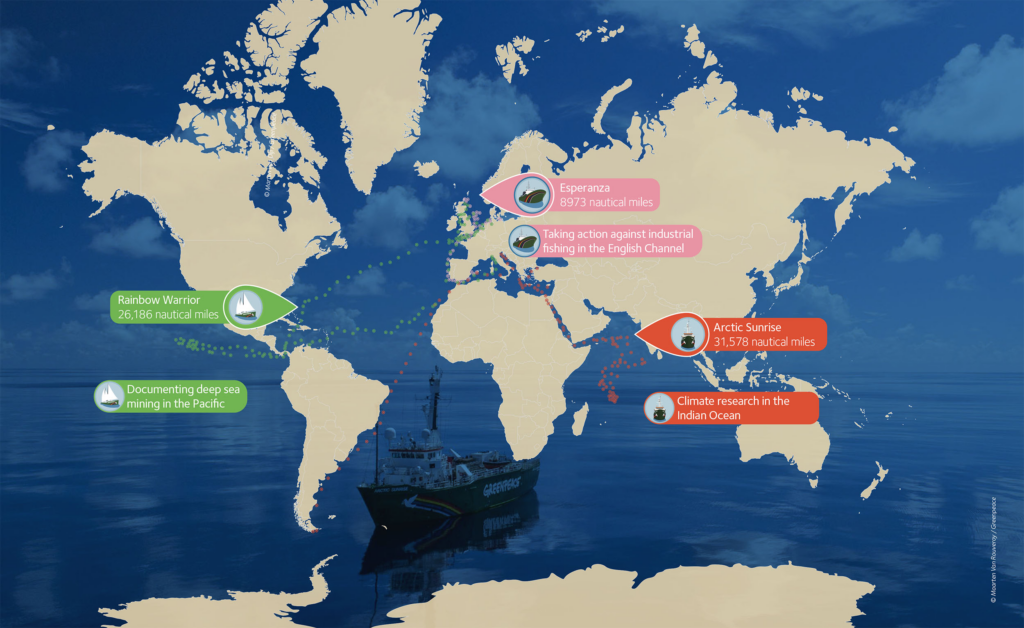
Climate crisis: Emergency action from COP26 to Cambo
As the UN warned of a ‘code red for humanity’, we made world leaders end their silence on fossil fuels and helped stop the proposed Cambo oil field. Climate campaigner Ariana Densham recalls a year of relentless collaborative impact.
We know time is running out. We know we need to halve our CO2 emissions by 2030 to stand any chance of keeping the rise in global temperatures below 1.5 degrees. We know many governments and climate-wrecking industries are a lot better at ‘blah blah blah’ – as Greta Thunberg put it in 2021 – than at meaningful action.
But again and again last year, we showed the power of our collective voice. Take the final agreement from the COP26 climate conference in Glasgow. Ridiculously, the first draft made no reference to fossil fuels. So, within 24 hours, Greenpeace supporters sent 32,000 emails to COP President Alok Sharma, telling him to get serious. Days later, fossil fuels were finally part of a COP agreement for the first time. The pledges made by world leaders in Glasgow were nowhere near ambitious or urgent enough, but without the combined pressure from activists at the conference and around the world, the outcome could have been so much worse.
Even before COP26 began, we were holding governments to account and making headlines worldwide. As you can read later, our Unearthed investigative journalists revealed how nations at the heart of the fossil fuel and industrial meat industries were lobbying to weaken the latest UN climate change research. That story made news bulletins from South America to Japan.
And the world was watching again as four young climate activists sailed with us to the conference on board the Rainbow Warrior. Maria, Jakapita, Farzana and Edwin, from Mexico, Namibia, Bangladesh and Uganda, joined us to tell world leaders how their homelands are already bearing the brunt of climate change. At first, the Royal Navy and HM coastguard were put in our path as we approached the River Clyde. But then news spread that authorities were denying activists from the Global South permission to moor outside the conference. We were eventually allowed to pass, and the activists vividly shared their experiences with the world’s media as leaders negotiated inside. When we stand together, we cannot be ignored – and sharing our platform in this way helped to strengthen the voices of young people throughout COP26. As the conference continued, the Greenpeace community used every tool possible to make sure the pressure for progress never dropped. Working with Indigenous leaders, we took out full-page ads in the Financial Times and The Times explaining why carbon offsetting is a scam and how it impacts Indigenous communities. In towns and cities nationwide, Greenpeace groups put up posters featuring quotes from climate activists and joined protest marches to force action. And the 23 online videos made by our responsive teams in London and Glasgow were watched an incredible 5.6 million times during the conference. The outcomes of COP26 may leave a lot to be desired, but our combined determination was never in doubt.
“If somebody had suggested I’d have been here two years ago, in front of a Greenpeace ship, I would have told them they were off their heads. But the situation now means we’re coming together. We’ve got to collaborate for the benefit of all.”
– Jake Molloy, RMT union organiser, joined us on the Rainbow Warrior as we visited Aberdeen to call for a just transition for oil and gas workers.
In the build up to COP26, Boris Johnson had attempted to show his government as a climate leader. That claim was fully undermined, however, by his apparent intention to greenlight a new Cambo oil field, west of Shetland. Scientists have said there can be no new fossil fuel projects if we want to limit temperature rises to 1.5 degrees. So when we found out that companies involved in Cambo were seemingly about to start installing equipment at the site without a permit, we joined with our partners in the Stop Cambo coalition and got to work. Thousands of Greenpeace supporters emailed their MPs, and we threatened to take the government to court if it granted a permit to this climate-wrecking project. Activists on kayaks and on our ship Esperanza also confronted contractors close to the site. The result? Shell pulled out of the project, which the operator behind Cambo then swiftly announced was officially on hold. That’s what climate action looks like.
As we continued to push for a just transition away from oil and gas and towards green, renewable energy, we also spent last summer visiting communities at the heart of the fossil fuel industry. Working with Friends of the Earth Scotland and Platform, we sailed the Rainbow Warrior to Inverness, Aberdeen and Dundee, organising ‘town hall’ public discussions. These provided a powerful opportunity for local people, MPs, councillors and climate activists to discuss how we shift to a green economy that’s fair for everyone. We now need conversations between national and regional governments, local authorities, workers, unions and employers to continue, and one MP who took part committed to hold a session on a just transition with the all-party parliamentary group on oil and gas.
There’s no doubt that throughout 2021 we made it impossible for governments and companies to ignore the need for real progress. And in Cornwall, as US President Biden arrived for the G7 conference in June, we used a spectacular drone display to make sure our message couldn’t be missed. We choreographed over 300 brightly lit drones to first form images of animals at risk from the climate crisis, and then to spell out two vital words that our leaders cannot ignore: ACT NOW.
Forests: Targeting destroyers in the UK and Brazil
To have the biggest possible impact for our forests, we targeted the UK’s biggest supermarket and the world’s biggest meat producer. Forests campaigner Anna Jones explains why.
It was a year when Tesco was always in our sights – for one very simple reason. No other UK supermarket has bigger links to deforestation. Tesco sells more industrial meat and uses more soya for animal feed than any other store. To make way for all that soya, giant swathes of forest across South America are being torn down and set alight. That has to stop – and that means Tesco has to break its links with notorious forest destroyer JBS, the world’s biggest meat producer.
So we asked our local groups and online supporters to visit their local stores and raise awareness of Tesco’s devastating links with deforestation. We produced a special action pack containing selfie placards and posters perfect for shop community noticeboards. And, as ever, the Greenpeace community didn’t hold back. In total, volunteers visited over 1,000 stores, heaping pressure on Tesco to cut forest destroyers out of its supply chain.
We also paid a visit to Tesco’s AGM, where delegates were greeted by activists holding giant letters spelling out ‘FOREST CRIME’ and reading out many of the 10,000 handwritten messages of support we had collected from Tesco customers. The store ended up closing its press office on the day of the AGM, unable to cope with a deluge of emails and phone calls from Greenpeace supporters demanding it drops forest destroyers. By the end of 2021, our Tesco petition had been signed by 250,000 people.
And while the store is still buying from companies linked to JBS, we’re not going anywhere. Our 2021 film, ‘Do You Know Tesco’s Burning Secret?’, has now been watched nearly half a million times, and we also published a major research report – ‘Making Mincemeat of the Pantanal’ – to put JBS itself, and therefore Tesco, firmly in the spotlight. Brazil’s Pantanal region is the world’s largest tropical wetland, but an area 11 times the size of London was on fire in 2020, with JBS clearly implicated.
Until Tesco cuts its links with forest destroyers, the store is showing its willingness to sacrifice our climate, our forest ecosystems and the rights of Indigenous communities. In solidarity with these communities, Greenpeace supporters also protested outside the Brazilian Embassy in August, condemning the Brazilian government’s anti-Indigenous policies and land grabs. And when a Bill in the Brazilian parliament greenlighted further forest destruction, we worked with WWF to bring together a coalition of 40 UK companies to co-sign a letter to Brazil’s legislators, threatening to boycott Brazilian products if this law is passed.
We know campaigning like this takes time, but it also works. Back in 2019, we targeted Burger King in a similar, single-minded way, exposing the restaurant’s links to forest destruction. In 2021, it announced plans to move towards a 50% plant-based menu by 2030. With your support, we make long-term change happen.
Oceans: With communities, fighting for protection
As oceans campaigner Will McCallum recalls, in 2021 we took action on the water, under the water and with the people most at risk to keep our precious oceans safe.
We began the year with a major investigation in the Indian Ocean, capturing harrowing footage of sharks and manta rays being trapped and killed in illegal driftnets. After we published our findings in a new report – ‘High Stakes’ – global media coverage followed, and fishing lobbyists were forced onto the defensive.
Scientists then joined us on board our ship Arctic Sunrise as we continued our Indian Ocean voyage to study the Saya de Malha Bank. It’s the world’s largest seagrass meadow – and a vital carbon sink – but so remote that little is known about it. Using pioneering eDNA sampling and hydrophone technology, scientists collected evidence of diverse marine life in the area, building the case for the creation of an ocean sanctuary here.
One of the scientists, 24-year-old Shaama Sandooyea, then used the opportunity to stage the world’s first underwater climate strike. Her message to world leaders – ‘We can’t keep treading water on the climate crisis’ – reached millions after being shared by Greta Thunberg. We shared stories from the coastal communities of Mauritius, Seychelles and Madagascar too, through our Vital Ocean Voices project.Individuals and local organisations documented how destructive fishing, the climate crisis and pollution are already devastating wildlife and traditional ways of life. As world leaders meet to negotiate a Global Ocean Treaty in 2022, these are the insights they must listen to.
Closer to home, we also continued to take direct action to stop destructive industrial fishing in UK waters. The Marine Protected Areas that surround our coastline are protected in name only, with the amount of time supertrawlers spent fishing in UK protected waters increasing by 1000% between 2017 and 2020. So, over a week in February, we built an underwater boulder barrier in the Offshore Brighton Marine Protected Area to stop bottom trawlers fishing in the area and ripping up the seabed. Then, throughout the summer, we launched Operation Ocean Witness, inviting MPs, celebrities, journalists and campaigners to join us as we patrolled UK waters, confronting illegal fishing vessels and showing an audience of millions why protection is urgently needed.
Finally, on a bright sunny day in September, we sailed to Westminster with a flotilla of fishing boats, having joined with fishermen, charter skippers and fishing businesses to declare a state of emergency in UK waters. Fishing communities are being devastated by industrial fishing, so we made sure we got MPs attention, then launched our new film – ‘High & Dry: How UK fishermen were sold out by Brexit’ – to call for urgent action to reverse decades of ocean exploitation.
Plastics: Going viral and driving political action
When we exposed the truth about supposedly recycled UK plastics being dumped overseas, the story sent shockwaves around the world – and the Turkish government responded fast. Campaigner Maja Darlington shares the details.
It began with Greenpeace investigators visiting Adana in southern Turkey in early 2021. There, they found plastic waste from UK stores like Tesco, Asda and M&S dumped in fields, near rivers, on train tracks and piled up by roadsides. Much of it had been burned. And it was recent – they even found a Covid-19 test packet among the mountains of waste.
This is the true picture of UK plastic recycling today. Less than 10% of the UK’s household plastic packaging waste actually gets recycled in the UK. As we revealed in our 2021 report ‘Trashed’, more than half of what the government claims is recycled in fact gets dumped overseas, where it pollutes the environment and wrecks human health. People of colour also tend to be disproportionately affected by dumped plastics, because structural inequalities mean they are more likely to lack the political, economic and legal means to oppose what’s happening.
The report got a massive response. It was the lead story everywhere from Radio 4’s Today programme to the Jeremy Vine show on ITV, with editorials in The Guardian, The Sun and The Daily Telegraph. Trashed was then mentioned in parliament and the Prime Minister said he had read the report ‘with worry’. Within days, the Turkish government announced a ban on most plastic waste imports ‘to protect the health of [its] environment and citizens’. That’s the power of investigating and exposing threats to our planet.
Alongside the research report, we launched Wasteminster, a short animated film that shows Boris Johnson getting swamped by the amount of plastic waste the UK dumps on countries like Turkey every day. It was watched one million times in just 24 hours, going on to gain over 10 million views.
More than 250,000 people then signed our petition calling on the government to stop dumping plastic waste on other countries. The issue had broken into the public consciousness, and the government’s previous ‘out of sight, out of mind’ attitude was no longer an option. It’s now our role to make sure this attention doesn’t fade, not least because companies have continued to lobby Turkey to soften its import ban.
Put simply, there is no way to recycle our way out of the plastics crisis. Recycling is part of the solution, but we need to drastically reduce the amount of plastic we produce – and that needs bold, urgent action from politicians and companies. We ran a poll with YouGov in 2021 that showed 85% of people want the government to force retailers to cut plastic packaging. But, right now, only the US produces more plastic waste per person than the UK, so we’ll keep working to make sure the momentum we inspired in 2021 continues to grow and get the results needed to tackle the plastic problem.
Unearthed: Setting the green news agenda
Throughout 2021, Unearthed journalists broke the biggest environmental news stories – and the world’s news outlets followed their lead. Editor Damian Kayha remembers a momentous year.
When a news story you’re responsible for ends up prompting a United States congress investigation, you know you’re doing something right. That was the situation we found ourselves in last year, after we went undercover to expose ExxonMobil’s efforts to undermine climate action in the US.
An Unearthed journalist posed as a headhunter, prompting one of the oil giant’s most senior Washington lobbyists to reveal on camera that ExxonMobil has aggressively fought against climate legislation through “shadow groups” – despite claiming in public to support climate action.
It was the most impactful investigation Unearthed has ever been part of. The story was covered across US network TV and by almost every major media outlet, and our video about the revelations was watched 1.45 million times. Eventually, it led to a Congress hearing into climate misinformation across the entire
oil industry.
Our story exposing how the world’s biggest coal, oil, beef and animal-feed producing nations were trying to water down a landmark UN climate report also gained wall-to-wall media coverage. Based on leaked documents passed to Unearthed journalists, the investigation revealed how Saudi Arabia, Brazil, Japan and Australia had asked the UN to play down the need to move away from fossil fuels. It was the main story on every BBC outlet and led news bulletins worldwide, clocking up more than 2,000 items of coverage. There were many other stories like these, in what proved to be a landmark year for Unearthed. More now than ever, our journalists are exposing the people willing to sacrifice our planet’s future for profit – and leaving them with nowhere to hide.
Allyship: Working towards our anti-racism commitments
As Meena Rajput, our Diversity & Inclusion and Anti-Racism Lead explains, throughout 2021 we increased support for grassroots groups, revealed the links between racism and climate change, and kept striving to put anti-racism at the heart of everything we do.
Back in 2020, we made four commitments to tackle systemic racism. We committed to help achieve stronger representation of black people and people of colour in our sector – particularly at leadership level. We pledged to become strong allies of the anti-racism movement, exposing the connections between racism and environmental abuse. We committed to organise ongoing anti-racism education for our staff. And we resolved to constantly hold ourselves to account.
In 2021, these commitments inspired new relationships and new ways of creating positive change. As well as supporting Indigenous communities and elevating Global South voices at COP26, we’ve sought to share our resources and expertise with even more grassroots groups. Through our Open Workshop approach, we sought out links with more groups led by people of colour – often those working to confront social and racial injustice as well as environmental injustice. To support these groups to achieve their goals, we loaned equipment, made banners, provided meeting space and gave advice on campaigning tactics.
Our commitments shaped our planning internally too. We now have an organisation-wide anti-racism plan, and every team ran sessions to align their own objectives with this. We also appointed one of our deputy programme directors to take the lead on anti-racism in relation to our campaigns, and we employed an allyship coordinator to help us be better allies to groups campaigning against racism and for our planet.
And to start more conversations and keep raising awareness, we also published a range of blogs and videos, asking questions like ‘Is climate change racist?’ and sharing the achievements of unstoppable Black climate activists. In the face of systemic racism, we will not be silent.
Global impact
Stories from around the world
Netherlands
Together with Friends of the Earth Netherlands, ActionAid, a range of Dutch climate organisations and over 17,000 individual co-plaintiffs, we won a historic victory over oil giant Shell in 2021. A Dutch court ruled that Shell is liable for damaging the climate, marking the first time a major fossil fuel company has been held accountable for its role in the climate crisis. Shell has now been ordered to radically reduce carbon emissions.
Aotearoa (New Zealand)
In September 2021, New Zealand’s Supreme Court said ‘no’ to seabed mining in the South Taranaki Bight. Together with Indigenous Peoples, local communities and environmental groups, we’ve campaigned against the plan for years. This area is home to Pygmy blue whales, mäui dolphins, blue penguins and a vibrant coral reef system. This decision sends a clear message to other mining companies waiting in the wings: you’re not wanted in Aotearoa or the Pacific.
Indonesia
Courts in West Papua revoked several palm oil plantation permits over lands belonging to the Moi Indigneous People in Sorong district, in response to campaigning from Indigenous people and NGOs, inc. Greenpeace. A pro-community and pro-nature legal win like this is a rarity in Indonesia, due in part to the influence of power and money in the justice system.
Gambia
There was reason for celebration in Gambia in 2021, when the government listened to protests from women fish processors and community leaders and ordered a major Chinese fishmeal plant to stop operating. To keep the pressure on for further action, Greenpeace Africa then published a new investigation showing how the fishmeal and fish oil industries have flourished during the Covid-19 pandemic.
Mexico
Campaigners in Mexico were celebrating last year after they helped bring about a presidential decree prohibiting genetically modified corn. GM organisms and phosphates are a big problem for our environment, putting entire ecosystems at risk. This victory was the latest sign of progress in Greenpeace Mexico’s two-decade campaign for food production that doesn’t cost the earth, supports people’s health and ensures farmers can earn a good living.
China
The end of the fossil fuel era seemed nearer than ever after China’s President Xi Jinping pledged that the country would not build any new coal-fired power projects overseas. The promise followed similar pledges from Japan and South Korea. No other country invests more in overseas coal plants than China, making this a big step forward. Now China needs to follow a similar path domestically and rapidly shift its economy to be powered by sustainable, renewable energy.
South Africa
In December a High Court in Makhanda ordered Shell to immediately cease its seismic blasting for oil and gas along South Africa’s Wild Coast after a legal case brought by Greenpeace Africa and others. Shell was originally granted permission to blast shockwaves every 10 seconds for five months into a fragile and beautiful ecosystem that is a vital whale breeding ground. Local community resistance coupled with legal action resulted in this brilliant win for the oceans and our climate.
Canada
In June 2021, the Keystone XL pipeline was finally stopped. This is a major victory for people who’ve been resisting new fossil fuel infrastructure and calling for alternatives and it was made possible by Indigenous communities who resisted this destruction on their lands — and never gave up. People power will light the way to a world beyond fossil fuels. In the United States and Canada, at least 21 fossil fuel projects have been prevented or delayed by Indigenous-led resistance. That’s the equivalent of 400 coal-fired power plants’ worth of pollution, according to analysis from the Indigenous Environmental Network (IEN) and Oil Change International.
Funding our mission
Your unwavering support inspired us throughout 2021 says Interim Fundraising Director Deborah McLean.
2021 marked Greenpeace’s 50th year and we wanted to use this moment not just to reflect on how far we’ve come and how much there’s still to do, but to pay a special tribute to the generosity and ongoing commitment of all of our supporters. We’re incredibly grateful for all you help us to achieve. Your support gives us the ability, inspiration and courage to act. Nothing changes without you. Thank you.
This year we continued to face the impacts of Covid-19. Our face-to-face programme was unable to operate for large parts of the year and a number of festivals including Glastonbury didn’t go ahead. Our teams continued to adapt and made 2021 a successful year. Thanks to your generosity, we managed to raise more money than expected and were able to put this to use doing more to tackle the climate and nature crises. We were also incredibly grateful to receive a significant legacy gift late in December which we couldn’t spend by the end of the year. This gift is is being carried forward to help fund our campaigns in 2022. Thank you so much for making our work possible.
Where our money came from
What we spent it on
These are the combined accounts of Greenpeace UK Ltd and Greenpeace Environmental Trust, which funds the promotion of sustainable development, scientific research, investigations and educational projects that further our understanding of the effects of human activity on the natural environment. If you would like to enquire about making a charitable gift to Greenpeace through a Foundation or Trust, please contact Louise Krzan on 020 7865 8175.
Protecting the oceans together with the Underwood Trust
The Underwood Trust has been one of the most committed and generous supporters of our work to date.
They’ve helped end commercial whaling, including assisting our colleagues Junichi and Toru, when they were wrongly put in prison for stealing whale meat and they seed-funded the creation of the first organisation (Low Impact Fisherman of Europe) to support small-scale fishers across Europe.
Then in 2019, when Greenpeace launched its global, multi-year 30×30 oceans campaign to demand at least 30% of our oceans be properly protected by 2030, The Underwood Trust were the first to come aboard with a significant donation that led to us raising several million pounds more.
This funding enabled Greenpeace’s most ambitious ship expedition to date: sailing scientists, journalists and activists from pole to pole, to expose the threats and build a movement of millions calling for ocean protection.
We’d like to thank the Underwood Trust for their transformational support and hope they are as proud as we are of all the work delivered to get us ever closer to the big systemic change we need to really protect our oceans at the scale needed – a Global Ocean Treaty.
A special thank you
We can’t thank you enough for your support. As the pressures on our planet keep on growing, your support makes all of the progress in this report possible.
We would like to acknowledge the following individuals and organisations for their generous contributions in 2021:
- A. Ryder
- Alerce Trust
- Alex Dale
- Alexander Samwer
- Andrew and Sue Johnston
- Anne Hess
- Birthday House Trust
- Brenda Cherry
- Brian Gaze and Family
- Britta & Jeremy Lloyd & family
- Bryony Dahl
- C. Lawrie
- Chris & Jane Oglesby
- Clare Milne
- Dale Vince
- Emily Feldberg and Elizabeth Atkinson
- Energy Transition Fund
- European Climate Foundation
- Fondation VRM
- Gideon Israel
- Greg & Sam Nasmyth
- Henocq Law Trust
- James Arnell
- James Gibson Charitable Trust
- James McGrane
- Jamma International
- Joanna Beckitt
- John Ellerman Foundation
- John Peck and Bindy Saywood
- Jorge & Lindsey Villon – Grace Fund
- Joseph O’Brien
- Julia Davies – We Have The POWER
- K. Roper
- Keith Clarke CBE
- König Family
- Levine Family Foundation
- Luminate
- Mark Cropper
- Martin & Åsa Hintze
- Matthew & Audrey Lawfield
- Matthew Eyton Animal Welfare Trust
- Mick Braddick
- Moondance Foundation
- P. Marsh
- People’s Postcode Lottery
- Peter Rigg
- Philip Breeze Will Trust
- Reed Family Foundation
- Richard Coates
- Ridgeback Trust
- Rob Button
- Rod & Diane Wood
- Roger de Freitas
- Roger Ross & all at Lots Road
- Rose Heatley
- S. Humphrey
- Simon Franks
- Sir Quentin Blake
- Stella McCartney Foundation
- Stephen Brenninkmeijer
- Susan Cooper
- Susie Hewson
- The Adlard Family Charitable Foundation
- The Becht Family Charitable Trust
- The Derek and Clare Stevens Trust
- The Esmee Fairbairn Foundation
- The Frederick Mulder Foundation
- The Laura Kinsella Foundation
- The Lister Charitable Trust
- The Mitchell Trust
- The Orp Foundation
- The Peter Smith Charitable Trust for Nature
- The Rowlands Scott Charitable Trust
- The Sheepdrove Trust
- The Sunrise Project
- The Underwood Trust
- The Waterloo Foundation
- The Wright Family Foundation
- Tim Yetman & Catherine Bryan
- Tinsley Charitable Trust
- Tony Duburcq and The Green Trust
- Tristan Ramus
- Val Carlill
- WFH Trust
- William Chalmers
A powerful legacy
Every year we are honoured to receive gifts from supporters who include Greenpeace in their Will.
We would like to pay tribute to the compassion and generosity of the following people:
- Alexander Allan Lester
- Mary Josephine Walters
- Aziza Dinath-Seedat
- Roy John Laverick
- Thomas Michael Mitchell
- Kevin John Huxley
- Zofia Kosinska
- Phyllis Edna Huson
- Kenneth Robinson
- Kareen Iverez Diniz
- Winston Wallace Taylor
- Keith Miles Elliot
- David Viktor John Styles
- Vera Evans
- Hilary Farrow
- Joyce Willcox Randall
- Cheryl Patricia Tongue
- Margaret Webster Cooper
- Pamela Joan Raven
- Judith Dorothy Green
- Paul Hermon
- Ruth Dorothy Abbott
- Mary Hamill
- Margaret Ruth O’Neill
- Hilary Farrow
- Sydney Edward Horsley
- Laureen Mary Lessels
- Alan John Abbott
- Madeleine Mary Kinlen
- Geoffrey Dyson Palmer
- Olive Sybil Parfitt
- Robert Garry Scott
- Eliot Bernard Levin
- Joan Bevan Bowman
- Joanna Louise Crabtree
- Peggy Patricia Johnson
- Doria Helena Mason
- Christopher Richardson
- Archibald Maclean
- Maureen Betty Fairley
- David Robert Porter
- June Monica Guidery
- Herbert James Sargent
- Jennifer Margaret Beach
- Andre Beeson
- Carolyn Bell
- Michael George Day
- Sarah Kathryn Forman
- Patricia Jean Goodwin
- P M Grimley
- Carolyn Ashton Guillot
- Wendy Harris-Taylor
- Angela Headley Howard
- Val Lambillion
- Ginetta Maria Martinez
- Catherine Pennington
- Peter Wilkinson
- Joan Primrose Wilson
- Plus 73 others
